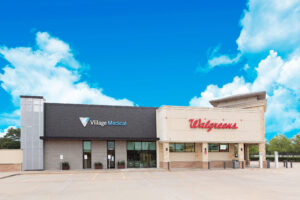
After years of the healthcare industry sticking with the traditional fee-for-service model, VillageMD CEO Tim Barry is encouraged by the shift he’s seeing to a value-based care model.
“There’s a continuing recognition from physicians in this country that there’s a better way to deliver care and to do it in a more integrated, more connected, more coordinated way and with an orientation around the patient,” he said in an interview. “That’s what excites me.”
Barry made these comments after the value-based company announced Thursday that it completed its $8.9 billion acquisition of Summit Health-City MD. Chicago-based VillageMD, which is majority owned by Walgreens Boots Alliance, is a primary care provider. Summit Health-CityMD is a provider of primary, specialty and urgent care services. The combined entity has more than 680 clinics and about 20,000 employees caring for 7 million patients across 26 markets.
He added that he’s noticing more collaboration in healthcare among different areas of care.
“It used to be that we would just talk about primary care doctors all the time … I think it’s starting to pick up at a bigger and bigger pace with other specialties,” he said. “That part excites me because I don’t believe we ever really fixed the problems of our healthcare system. [We need to] have doctors in this country who feel empowered and who feel accountable and who know that they can work side-by-side with their professional colleagues to deliver the best outcome for the patient, and not have to worry about this fee-for-service silo mindset.”
This kind of integrated, value-based care is what Barry is trying to create with the VillageMD-Summit Health acquisition. Through the acquisition, Summit Health will begin to incorporate VillageMD’s value-based care initiatives, while VillageMD will add in Summit Health’s multi specialty care services, Barry said. Some of the multi specialty services that Summit offers includes cardiology, gynecology and orthopedics.

A Deep-dive Into Specialty Pharma
A specialty drug is a class of prescription medications used to treat complex, chronic or rare medical conditions. Although this classification was originally intended to define the treatment of rare, also termed “orphan” diseases, affecting fewer than 200,000 people in the US, more recently, specialty drugs have emerged as the cornerstone of treatment for chronic and complex diseases such as cancer, autoimmune conditions, diabetes, hepatitis C, and HIV/AIDS.
“We can bring the best-of-breed capabilities that we have at VillageMD around value and risk-based care delivery and bring that to Summit,” he declared. “At the same time, we can bring this integrated, connected care model that has been Summit’s legacy and bring that into VillageMD so that we can provide more comprehensive services to patients in a more integrated, coordinated way, but always tie to value and risk-based contracts that reward us for delivering better outcomes at a lower cost.”
The future of healthcare isn’t entirely bright, however. One thing that concerns Barry is the potential technologies could have in creating a more siloed system. While there are a lot of benefits to digital health in terms of access, it has also led to a lot of point solutions.
“The healthcare system has all these different fiefdoms and if all we’re doing is adding more fiefdoms, now we’re just adding them digitally as opposed to physically, we run more of a risk of fragmenting the system … If you end up seeing three doctors in a physical setting and then you’ve got three other companies trying to sell you something digitally and you’re engaged with them, they may not be connected and coordinated,” he said. “I think we run the risk of frankly, only making people more confused, more frustrated, sicker and then ultimately costing the healthcare system more.”
He added that technology needs to provide a connection between the patient and their primary care physician.
“We need to make sure that these new inventions, these new innovations, are thinking about how it coordinates care more with the patient and their doctor than it does to further separate people from the plan of care they might have with their doctor,” Barry said.
Photo credit: Walgreens













